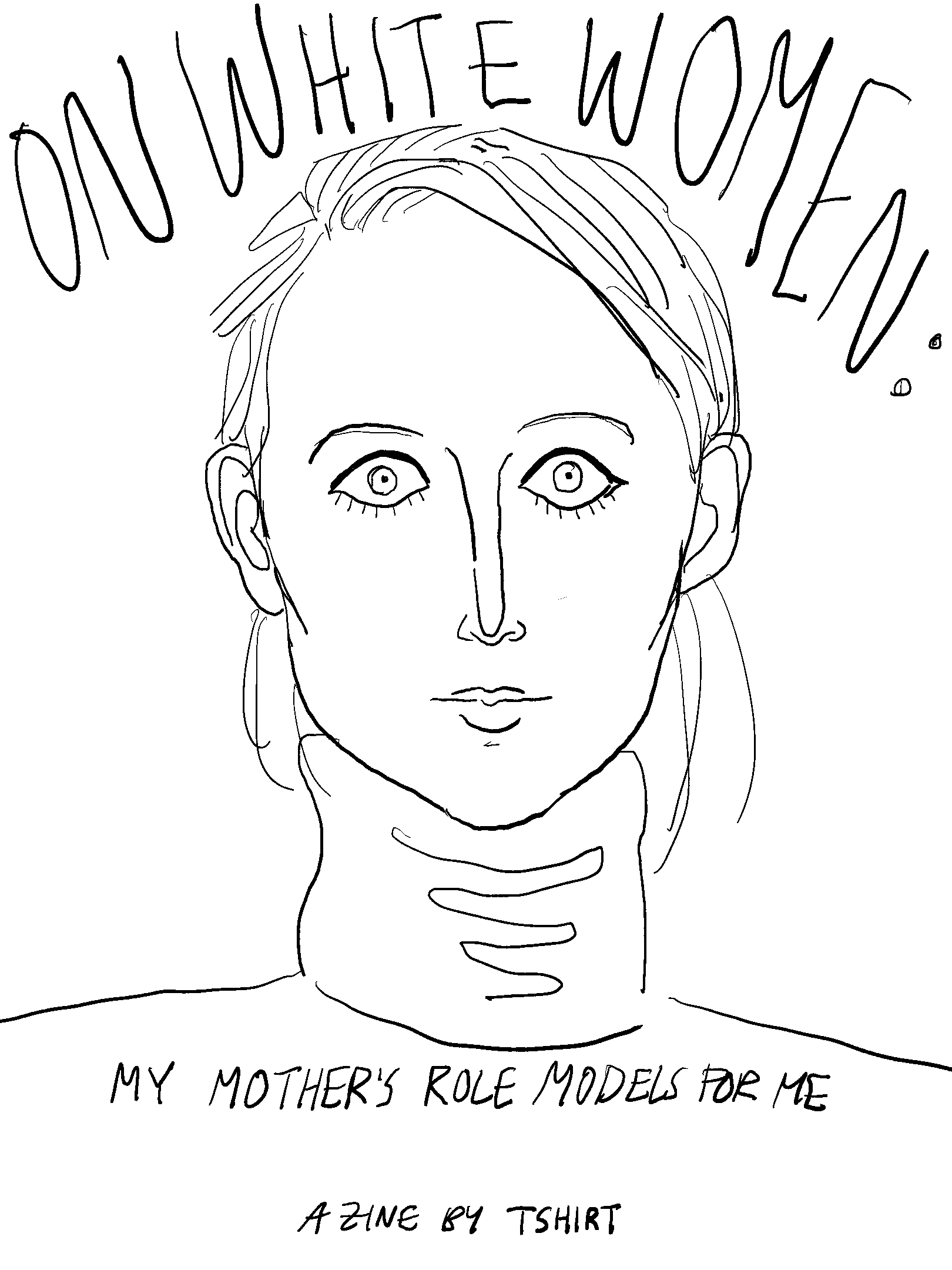ON WHITE WOMEN

When I told my mother I wanted to start taking testosterone, she told me to write Elizabeth Holmes. In her fantasy, I sent a letter all the way to that Bryan, Texas federal prison where Holmes is serving her eleven year sentence, and I asked her what the secret to deepening your voice without testosterone was. We might develop a friendship, my mother believed, bonding over our attachment to black turtlenecks and our failure to be women the right way.
Holmes was not as insulting of a choice as you might first think. My mother had long maintained Holmes’ semi-innocence. That is, Elizabeth Holmes did what she did, but she was only being punished because she was a woman, and therefore we ought to feel some sympathy for her in that regard. This was typical for my mother. I learned what insider trading was when I learned that Martha Stewart was going to prison for it and that she was only going because she was a woman. Everyone inside traded, my mother informed me solemnly, but some of us couldn’t get away with it.
My mother believes she raised a feminist, and she did. If nothing else, she did instill in me a keenly felt sense of the importance of fairness. But she also gave me a fascination with these white collar criminal white women and the abrogation of their privilege—or rather, in my interpretation, the way their privilege was expressed. White women had the space to fuck up, I decided. And they would fuck up because some nebulous “they” would make them. The lesson I took away was that you had to dream of being a forgiven fuck up, because it was going to happen either way.
Something I never told my mother was that I took up her fantasy. In my daydream continuation, I wrote to Elizabeth Holmes. She wrote back, and so I wrote to her again, and so on and so forth until finally, in the fullest culmination of the fantasy, she would take advantage of me somehow, in a reverse gendered Christie Smythe and Martin Shkreli. I know Elizabeth Holmes is happily married. I learned it from Amy Chozick’s New York Times piece, the “Call me Liz” one, the one everyone righteously pilloried for attempting to launder Holmes’ crimes.
When I read that New York Times profile, I could feel myself falling for it. It’s the same reason I can’t watch Columbo. I end up rooting for the murderer, as if Columbo’s great folksy scrutiny is on me instead, for the crime of looking through the eyes of a killer. I can’t help but identify with the most forceful point of view in the area sometimes. So maybe the fantasy I took up, really, was in true white woman fashion, the fantasy to have someone else to blame for fucking up.
Like my mother, for instance.
Which would be unfair. She has only ever wanted for me to be happy. Unfortunately for that, we have read Sara Ahmed, and we know her translations of the phrase “I am happy if you are happy.”
- I am happy if you are happy.
- I will only be happy if you are.
- I will be unhappy if you are.
- Your unhappiness would threaten my happiness.
- You have a duty to be happy for me.
I just want her to be happy.
I am often unfair to my mother. For example, even the premise of this essay is something she disagrees with. When I told her about it, she asked why it was about white women, not all women. My mother doesn’t see white women as a separate species the way I do. She dislikes reducing things down to race (unless it’s the success of an Asian person, which is then a credit to Asians everywhere). And she sees Martha Stewart and Elizabeth Holmes’ fates as tied to her in a way I’m skeptical of.
But maybe she’s right. When you have a hammer—or when you read too much theory—maybe everything does look like white women. I tried to take her at her word. I started listing Chinese women who are white collar criminals. What about Fan Bingbing? Do you support her tax evasion? That made her laugh. She doesn’t support just anyone, she said. So who does she support, if not only white women? It seems like it’s really a subclass of women who fail: women who also have a compelling story.
I’m telling a story about my mother right now. I hope it’s compelling. What did she fail?
By most counts, not much. She’s successful and raised a family. But I still remain. She can’t be happy til I’m happy til she’s happy. And so on. We’re like an ouroboros of failed expectations. She wants my life to be easy: she wants me to be white enough to escape racism; she wants me to be woman enough to escape transphobia. But it doesn’t work like that—just like you can’t be rich enough, or girlboss enough, to escape misogyny, or four counts of criminal fraud. She has a weak spot for us anyway. I have her same weak spot for women with a story, women who have reasons for doing what they did, even if they’ve hurt people in the process. Elizabeth Holmes is a missing link between us.
My problems are textbook at their core. Why isn’t my mother perfect? Why do I have to be trans? Why do I identify with white women, even as I try my hardest to define myself as something else? They all kind of boil down to the same question in the end: how do you love someone who disappoints you? And the answer to that is more easily than you might think.